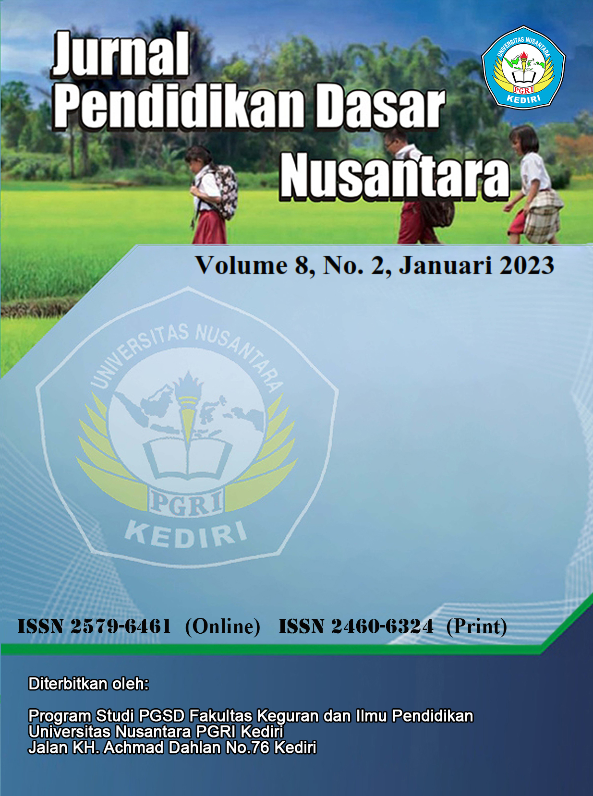Analysis of education policies for elementary school children in the industrial revolution 4.0 era
DOI:
https://doi.org/10.29407/jpdn.v8i2.19279Keywords:
industrial revolution 4.0, 21st century, elementary schoolAbstract
The era of the industrial revolution 4.0 in the aspect of education that plays an important role is educators or teachers, one of the goals is for students to understand digital literacy. But in this era the role of educators will not be replaced by technology. Because in the practice of learning, educators teach character, morals and role models for students. The purpose of this article is to describe the role of elementary school educators in the era of the industrial revolution 4.0 in accordance with existing policies and the role of parents of elementary school students in the era of the industrial revolution 4.0. This study uses the literature study method, namely by searching for literature from various sources, especially Google Scholar, then analyzing reference sources that are in accordance with the issues raised. An important finding obtained from this research is the increasing professionalism of educators or teachers which will have an impact on increasing the quality of elementary school education in entering the era of the industrial revolution 4.0.
Downloads
References
Aoun, J. (2018). Robot-prof: higher education in the age of artificial intelligence. https://doi.org/10.1080/02607476.2018.1500792
Hadiyant. (2004). Mencari Sosok Desentralisasi Manajemen Pendidikan Di Indonesia. Rineka Cipta.
Ihsan maulana, N. N. (2019). ANALISIS KEBIJAKAN PENDIDIKAN ANAK USIA DINI DI ERA REVOLUSI INDUSTRI 4.0. Jurnal Pendidikan Tambusai, 8(5), 55.
INDONESIA, P. M. A. R. (2017). NOMOR 16 TAHUN 2010. TENTANG PENGELOAAN PENDIDIKAN AGAMA PADA SEKOLAH.
Kurnianto, B., & Rahmawati, R. D. (2020). Hubungan Pola Asuh Orang Tua terhadap Motivasi Belajar Siswa Pada Pembelajaran Daring Masa Pandemi. Sendika, 2(1), 1–11. http://conference.upgris.ac.id/index.php/sendika/article/view/1058
Notanubun, Z. (2019). Pengembangan Kompetensi Profesionalisme Guru di Era Digital (Abad 21). Jurnal Bimbingan Dan Konseling Terapan, 3(2), 54. https://doi.org/10.30598/jbkt.v3i2.1058
Nurhafizah. (2011). Kemampuan Berkomunikasi Sebagai Pilar Profesionalisme Guru Dalam Membimbing Anak Usia Dini.
Nurhafizah. (2018). Bimbingan Awal Kewirausahaan pada Anak Usia Dini. Jurnal Konseling Dan Pendidikan, 6(1).
Peng, L., Yen, Y., & Siswanto, I. (2020). Virtual reality teaching material - Virtual reality game with education. Journal of Physics: Conference Series, 1456(1). https://doi.org/10.1088/1742-6596/1456/1/012039
Putri, K. E., & Damayanti, S. (2019). Pengembangan E-Learning Menggunakan Portal Pembelajaran Mahasiswa pada Mata Kuliah Konsep Dasar IPA 2 di Era Disruption. Jurnal Pendidikan Dasar Nusantara, 5(1), 117. https://doi.org/10.29407/jpdn.v5i1.13182
Putri, K. E., Wiguna, F. A., & Asy’ari, A. H. (2022). Android Media Development Based on Augmented Reality in Photosynthetic Material for PGSD UN PGRI Kediri Students. AL-ISHLAH: Jurnal Pendidikan, 14(3), 2677–2690. https://doi.org/10.35445/alishlah.v14i3.1316
Putri, K. E., Wiguna, F. A., Keguruan, F., Pendidikan, I., Putri, K. E., Wiguna, F. A., Jurnal, J. (, & Pendidikan, P. (2020). Augmented Reality Based Learning Media in Fotosynthesis Material. Jurnal Penelitian Pendidikan IPA, 5(1), 1–5. http://journal.unesa.ac.id/index.php/jppipa
Ryegard, Asa. Karin Apelgren, & T. O. (2010). A Swedish Perspective on Pendagogical Competence. Uppsala University.
Shonkoff, J. P., Radner, J. M., & Foote, N. (2017). Expanding the evidence base to drive more productive early childhood investment. The Lancet, 389(10064), 14-16.
Sukanti. (2008). Meningkatkan kompetensi pendidik melalui pelaksanaan tindakan kelas. Jurnal Pendidikan Akutansi Indonesia, VI(1).
Tilaar, H. A. R. (1998). Beberapa agenda reformasi pendidikan nasional dalam perspektif abad 21. Indonesia Tera.
Unicef. (2012). The state of the world’s children 2012: children in an urban world. Esocialsciences.
Widyaningrum, W., Sondari, E., & Mulyati. (2019). Meningkatkan Kompetensi Profesionalisme Guru Di Abad 21 Melalui Pelatihan Pembelajaran Bahasa Inggris. DEDIKASI: Jurnal Pengabdian Masyarakat, 1(1), 35–44. https://e-journal.metrouniv.ac.id/index.php/JPM/article/view/1600
Yahya, M. (2018). Era Industri 4.0 : Tantangan dan Peluang Perkembangan Pendidikan Kejuruan Indonesia.
Yudha Adrian, R. L. A. (2019). KOMPETENSI GURU DI ERA REVOLUSI INDUSTRI4.0. 14(2), 175–181.
Downloads
Published
Issue
Section
License
Authors who publish with this journal agree to the following terms:
- Copyright on any article is retained by the author(s).
- The author grants the journal, the right of first publication with the work simultaneously licensed under a Creative Commons Attribution License that allows others to share the work with an acknowledgment of the work’s authorship and initial publication in this journal.
- Authors are able to enter into separate, additional contractual arrangements for the non-exclusive distribution of the journal’s published version of the work (e.g., post it to an institutional repository or publish it in a book), with an acknowledgment of its initial publication in this journal.
- Authors are permitted and encouraged to post their work online (e.g., in institutional repositories or on their website) prior to and during the submission process, as it can lead to productive exchanges, as well as earlier and greater citation of published work.
- The article and any associated published material is distributed under the Creative Commons Attribution-ShareAlike 4.0 International License

































